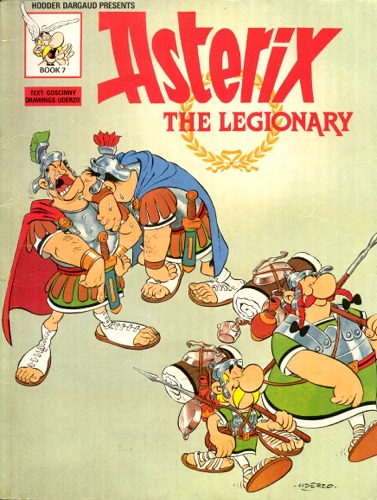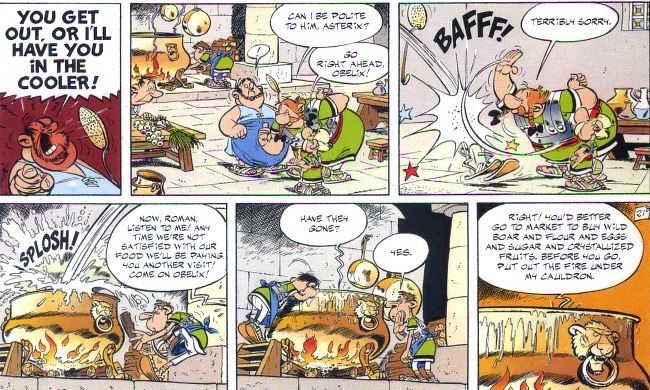Asterix vocabulary
Glossary 3/6: Asterix the Legionary
Astérix légionnaire, Astérix legionario, Astèrix legionari, Astérix lexionario, Asterix legionaria, Asterix legionario, Astérix Legionário, Asterix als Legionär, Asterix als legioensoldaat, Asterix drar i fält, Asterix legioonalaisena, Asteriks Lejyoner.
I can't give you free Asterix books, but for six of them I give you a glossary of all the Latin, and the unusual words, phrases and word games.
The glossary:
- Various gods and goddesses appear in all the Asterix books. Toutatis, Belenos, Belisama, Taranis, Lug, Epona (Gaulish); Jupiter, Mercury, Pluto, Minerva, Apollo, Vesta (Roman); Zeus, Hermes, Hades, Poseidon, Athena, Ares (Greek); Ra, Isis, Osiris, Horus, Anubis (Egyptian).
- Gaul (p3). A province of the Roman empire. Today it's France.
- indomitable (p3). A person who will always resist; unconquerable.
- fortified (p3). Made into a military base with strong walls.
- shrewd (p4). Understands a situation quickly; cunning, clever like a fox.
- a potion (p4). A magical liquid.
- a druid (p4). A Celtic priest.
- a menhir (p4). A megalith, like the big stones at Stonehenge and Carnac.
- a wild boar (p4). A wild pig. Obelix's favourite food.
- mistletoe (p4). A small green plant with white fruit. It grows on trees, and people say it is magical.
- a bard (p4). A poet, musician and teacher.
- majestic (p4). Impressive, like a king.
- Condatum (7). Rennes, a university town in Brittany, north-west France.
- to know the form (9). To know the correct way to do something.
- a dolmen (9). A Stone Age ceremonial structure made of three or four very big stones.
- quomodo vales? (10). Latin "How's it going?" or "How are you?"
- shy and retiring (10). A common English expression for "shy".
- a mastodon (p10). A prehistoric elephant.
- a legion (p12). A Roman army.
- Pompey (p13). A Roman general who wanted to be emperor.
- HQ (p14). Headquarters.
- a centurion of calends (p16). Roman staff officer (a captain).
- timeo danaos et dona ferentes (p17). Latin tag - “I fear the Greeks and their gifts" meaning "I don't trust them".
- a convoy (p17). A fleet of ships with a military escort.
- Massilia (p17). Massilia.
- a legionary (p19). A Roman soldier.
- a Briton, a Hibernian and a Caledonian (p20). Inhabitants of ancient Britain, Ireland and Scotland. There are lots of jokes that start “There was an Englishman, an Irishman, and a Scotsman...”
- a sestertius (p22). A Roman coin.
- a mess (p23). A military dining area.
- grub (p23). Food (an informal expression).
- in the nick of time (p23). An informal expression meaning “just in time”.
- a boar (p24). A wild pig.
- quartered (p24). To be cut into four pieces; or (military expression) to live somewhere.
- corn (p24). Barley. It can also mean wheat or maize. .
- don't you know (p24). Expression traditionally used by upper-class English people.
- the cooler (p25). A military prison.
- crystallised fruit (p25). Dried fruit preserved in sugar.
- a cauldron (p25). A very large cooking pot.
- a pilum (p25). A Roman throwing spear.
- a drill (p26). A military exercise.
- a cookhouse (p26). A military kitchen.
- a gladius (p26). Latin - a short sword.
- the crack of dawn (p27). An expression - very early in the morning.
- a route march (p27). A military exercise.
- “Rise and shine!” (p27). Wake up, get out of bed!
- to give somebody the sack (p27). To dismiss an employee.
- vis comica (p28). Latin - “comic power”. The ability to make people laugh, to be a comedian.
- Massilia (p28). Marseille.
- Attic (p29). Greek (adjective).
- "the isles" (p30). The British Isles.
- a stockade (p31). A military defensive wall made of trees, with the branches removed, placed vertically in the ground, side by side.
- a sentry (p31). A guard or sentinel. A soldier who must stand at the entrance or exit to a military base.
- frugal (p31). Thrifty, economical, inexpensive.
- civvies (p32). A military expression. Civilian clothes (not military uniform).
- a dressing-down (p33). A reprimand, strong criticism from a senior officer.
- a galley (p33). A long, thin ship which moves with twenty or thirty oars.
- encamped (p33). In camp (military expression... a civilian would say “camping”.
- Thapsus (p33). A city in what is now Tunisia.
- Let go aft! (p33). Release the rope that holds the back of the ship to land.
- All rows lead to Rome (p34). A very small joke... the usual expression is “all roads lead to Rome”.
- the stroke (p34). The pace or cadence of rowing.
- to sail close to the wind (p34). Expression from sailing - to take a risk.
- to take the wind out of somebody'e sails (p34). To stop somebody doing something, especially when it makes them look stupid.
- out of your depth (p34). Expression from swimming - to be in water too deep to stand up.
- to board a ship (p34). To put one ship next to another so the crew can attack on foot.
- to take evasive action (p34). Military expression - to run away.
- Hard a port! (p34). Command from the navy - "Turn left now!"
- we've been framed (p35). an expression meaning “we’ve been made to look as if we did a crime we did not commit". Literally, to be framed is to be put inside a picture frame. The picture of the pirates looks like the painting in the Louvre “The Raft of the Meduse” by Théodore Géricault, of the survivors of a famous shipwreck in 1816.
- by Jericho! (p35). A polite way to say “by Jupiter / Jove / Jesus”.
- a tot of rum (p35). A glass of rum.
- quo vadis? (p36). Latin - "Who goes there?" which is a military challenge meaning "Stop! Who are you?"
- to beetle off (p36). A 1930s public school expression meaning to leave or to go away.
- a rookie (p38). A military expression - a new soldier.
- an old hand (p38). A military expression - an old, experienced soldier.
- timeo danaos et dona ferentes (p38). Latin expression - if a Greek wants to give you a present, be careful!.
- dignus est intrare (p39). Latin - "he can go in".
- booze (p39). Alcohol (an informal word).
- a nitwit (p40). An idiot.
- Scipio (p41). A political and military rival of Julius Caesar.
- crying in the wilderness (p41). From the New Testament (St John the Baptist was called “a voice crying in the wilderness”, meaning “shouting in the desert”... but this is the other meaning of the verb “to cry” - weeping or sobbing in the desert!).
- cogito ergo sum (p41). Latin expression “I think therefore I am” attributed to the French philosopher René Descartes.
- to simmer down (p42). To calm down (to simmer is to cook something slowly, without boiling it).
- alea jacta est (p42). Latin - "we have thrown the dice" or “the die is cast”. As a metaphor, it means we can’t retreat now, there’s nothing we can do except fight. Julius Caesar said this after crossing the Rubicon river into Italy to challenge his rival Pompey for command of the Roman Empire..
- an advance party (p43). A military expression - the first part of an attacking army.
- the fat's in the fire (p43). A metaphor. When you burn fat, it spits and makes a lot of flame and smoke.
- (to make a) sortie (p43). A military expression - to come out of a fort and attack the enemy.
- a tortoise (p43). Roman military manoeuvre, the testudo. The legionaries stand close to each other and put their shields over their heads as protection against missiles.
- Condatum (p48). A town in Brittany, north-west France.



